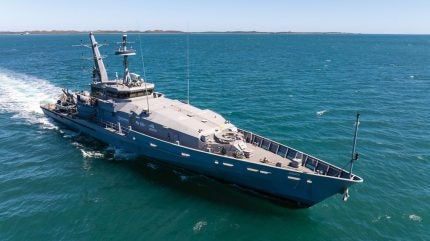
In collaboration with industry partners, Austal Australia achieves a milestone in the Patrol Boat Autonomy Trial, showcasing the potential for remote and autonomous operations in naval vessels.
In a feat for the Australian maritime industry, Austal Australia has completed the sea acceptance trials for the remote and autonomously operated vessel Sentinel as part of the Patrol Boat Autonomy Trial (PBAT) project. Conducted off the Western Australian coastline, these trials have demonstrated the feasibility of autonomous navigation.
The trials utilised Greenroom Robotics’ Advanced Maritime Autonomy (GAMA) Software and showcased remote and autonomous navigation events. Despite the regulatory and operating environment, the project team successfully manoeuvred the decommissioned Armidale-class Patrol Boat, Sentinel, through a series of scenarios, laying the groundwork for future autonomous naval operations.
As per GlobalData’s intelligence on the Australian defence market, the Australian Navy has previously acquired the Armidale-class, Cape-class, and Evolved Cape-class light combat vessels from Austal Australia.
The PBAT project, funded by the Commonwealth of Australia, is a collaborative effort between Austal Australia, Greenroom Robotics, Trusted Autonomous Systems, and the Royal Australian Navy Warfare Innovation Navy (WIN) Branch. The project has explored legal and regulatory frameworks for operating such vessels by repurposing the decommissioned HMAS Maitland into Sentinel.
At 57m in length, Sentinel has modifications to its navigation, communications, and electrical systems. Austal Limited CEO Paddy Gregg hailed the completion of sea trials as a landmark achievement, emphasising the potential for further collaboration with the navy to advance autonomous technology.
Greenroom Robotics chief technology officer Harry Hubbert echoed these sentiments, highlighting the collaborative nature of the project and its implications for future maritime capabilities. Similarly, TAS CEO Glen Schafer praised the project’s innovation and complexity, emphasising the importance of sovereign industry investment.
Commodore Michael Turner, Navy’s Director General Warfare Innovation Navy, lauded PBAT for its practical application of autonomous technology and collaborative spirit, marking a significant step forward in naval operations.
PBAT’s objectives, ranging from advancing remote operations to optimising crew workload, show the project’s significance in shaping the future of naval warfare. By leveraging lessons learned from the trial, the Royal Australian Navy stands poised to embrace autonomous maritime operations, enhancing efficiency and safety on the high seas.







